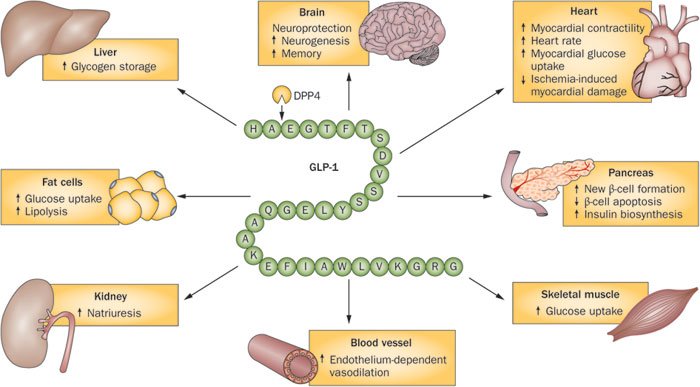
Introduction
GLP-1, or glucagon-like peptide-1, is a hormone that plays a crucial role in regulating various bodily functions, particularly those related to blood sugar control and appetite. This article will explore what GLP-1 is, how it functions, and its significance in the body. Additionally, we will discuss how GLP-1 influences weight loss, which is important for understanding the benefits of certain medications and treatments like Tirzepatide. If you’re interested in learning more about GLP-1 and its impact on weight loss, you can check out this link.
What is GLP-1?
GLP-1 is a hormone produced in the intestines in response to food intake. It belongs to a group of hormones called incretins, which are released after eating and stimulate a decrease in blood sugar levels. GLP-1 enhances the secretion of insulin, a hormone that helps cells absorb glucose from the bloodstream, thus lowering blood sugar levels.
Besides its role in insulin secretion, GLP-1 also slows down the emptying of the stomach, which helps to create a feeling of fullness and reduces appetite. This dual action on insulin and appetite makes GLP-1 an essential hormone for maintaining blood sugar balance and supporting weight management.
How Does GLP-1 Function in the Body?
GLP-1 functions through several mechanisms to regulate blood sugar levels and influence appetite. It stimulates insulin release, prompting the pancreas to release insulin in response to rising blood sugar levels after eating. This helps cells absorb glucose and lowers blood sugar levels. Additionally, GLP-1 inhibits glucagon release. Glucagon is a hormone that raises blood sugar levels by signaling the liver to release stored glucose.
GLP-1 inhibits the release of glucagon, preventing unnecessary increases in blood sugar. Furthermore, GLP-1 slows gastric emptying, which prolongs the feeling of fullness and reduces overall food intake. It also acts on the brain to promote a sense of satiety, which helps to reduce appetite and prevent overeating. These actions collectively help to maintain stable blood sugar levels and support weight management, making GLP-1 an important hormone for overall metabolic health.
The Role of GLP-1 in Weight Loss
Given its effects on insulin secretion and appetite regulation, GLP-1 has gained attention for its potential in aiding weight loss. By promoting satiety, GLP-1 helps to reduce the desire to eat, making it easier to adhere to a healthy diet and avoid overeating. By slowing gastric emptying, GLP-1 prolongs the feeling of fullness, which helps to reduce meal frequency and portion sizes.
Furthermore, GLP-1 has been shown to improve fat metabolism, helping the body to use stored fat for energy more efficiently. These combined effects make GLP-1 a valuable target for weight loss treatments. Medications that mimic the action of GLP-1, such as Tirzepatide, have been developed to help people lose weight by enhancing the natural effects of this hormone.
Medications That Target GLP-1
Several medications have been developed to mimic the effects of GLP-1 and support weight loss and blood sugar control. Tirzepatide is one such medication that has shown promising results. Tirzepatide acts on both GLP-1 and another hormone called GIP (glucose-dependent insulinotropic polypeptide), enhancing insulin secretion and reducing appetite. Clinical studies have shown that Tirzepatide can lead to significant weight loss in individuals with obesity or overweight. In addition to weight loss, Tirzepatide helps to improve blood sugar control, making it a valuable option for individuals with type 2 diabetes. If you’re interested in learning more about Tirzepatide and its benefits for weight loss and blood sugar control.
Conclusion
GLP-1 is a crucial hormone that plays a significant role in regulating blood sugar levels and appetite. By stimulating insulin release, inhibiting glucagon, slowing gastric emptying, and promoting satiety, GLP-1 helps to maintain metabolic balance and support weight management. Medications like Tirzepatide, which mimic the effects of GLP-1, offer promising solutions for individuals seeking to lose weight and improve their blood sugar control. Understanding the function of GLP-1 and its role in the body can help you make informed decisions about your health and wellness.
FAQs
1. What is GLP-1 and why is it important?
GLP-1, or glucagon-like peptide-1, is a hormone produced in the intestines in response to food intake. It is important because it helps regulate blood sugar levels by enhancing insulin secretion, inhibiting glucagon release, slowing gastric emptying, and promoting a feeling of fullness. These functions make GLP-1 crucial for maintaining metabolic balance and supporting weight management.
2. How does GLP-1 influence weight loss?
GLP-1 influences weight loss by reducing appetite and slowing digestion. It promotes a sense of fullness (satiety), which helps reduce overall food intake. Additionally, GLP-1 improves fat metabolism, allowing the body to use stored fat for energy more efficiently. These combined effects make GLP-1 an effective target for weight loss treatments.
3. What are GLP-1 mimetic medications and how do they work?
GLP-1 mimetic medications are drugs designed to mimic the effects of the GLP-1 hormone. They work by enhancing insulin secretion, reducing appetite, and slowing gastric emptying, which helps lower blood sugar levels and promote weight loss. One such medication is Tirzepatide, which acts on both GLP-1 and another hormone called GIP to provide these benefits.
4. Can GLP-1 mimetic medications like Tirzepatide help with diabetes management?
Yes, GLP-1 mimetic medications like Tirzepatide can help with diabetes management. By enhancing insulin secretion and reducing glucagon release, these medications help to lower blood sugar levels, which is essential for managing type 2 diabetes. Additionally, the weight loss benefits of these medications can further improve blood sugar control and overall metabolic health.
5. Are there any side effects associated with GLP-1 mimetic medications?
Like all medications, GLP-1 mimetic drugs can have side effects. Common side effects include nausea, vomiting, diarrhea, and constipation. These side effects are often mild and tend to decrease over time as the body adjusts to the medication. It is important to discuss any concerns or potential side effects with a healthcare provider before starting a GLP-1 mimetic medication like Tirzepatide.
For more information on GLP-1 and weight loss treatments like Tirzepatide, you can visit this link.